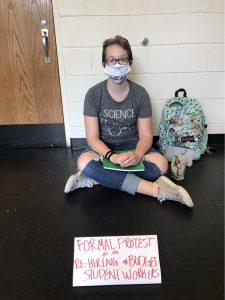By Elise Person, Staff Writer

The coronavirus pandemic has changed what the world once knew as normal. In-person activities, such as going to school and work, have taken on a new version of normality via virtual experiences. With many classes being moved online, hands-on professions like nursing have declined educationally because of the quality universities are able to teach these fields online.
When the coronavirus began spreading to college communities back in March 2020, universities sent students home, regardless of their major or area they were studying. Nursing students began taking classes online. For many, senior clinicals were cancelled for the remainder of the spring 2020 semester.
Senior clinicals are an important time and experience for those about to graduate and enter the nursing field because they are a chance for students to work one-on-one with a nurse in a specific field of nursing, get real on-the-job experiences, and work in a hospital.
First-year registered nurse Jenna Doherty’s clinicals were canceled and she is now unsure about starting her first job at Stony Brook University Hospital. “I believe I missed out on a huge opportunity to learn on the job experience when my senior clinical was canceled,” Doherty said. “Now that I am beginning my first job I am a little nervous that I have not been in a hospital or practicing nursing since March and that my nursing skills are going to be rusty.”
Doherty is not alone in this. Many universities across the nation cancelled their clinical programs for the spring semester, meaning Doherty is just one among many who lost this experience and are now applying for jobs as registered nurses.
Currently, only a few universities have resumed their senior clinicals. Long Island University Post campus is one of these schools. However, even the in-person clinicals are very different from how they were pre-COVID.
“Clinicals are still very educational, however not as educational as they would usually be,” senior nursing student Amanda Masullo said. “We aren’t allowed to do certain things. For example, inserting an NG tube or basically anything that has to do with the patient’s mouth, nose, bodily fluids, etc. It’s a shame because these are the times when you’re supposed to do things hands on and learn and we’re kind of deprived of that.”
Across the nation, nursing majors have had to be flexible and work within the different universities regulations. For example, universities are encouraging online courses, lectures, and labs. Nursing classes or simulations that were always taught in the classroom before the pandemic are now primarily online.
Doherty, a recent graduate from Post whose senior spring semester of nursing school was moved online, said that she was very lucky to have professors who were dedicated to helping the students learn. However, in her opinion, taking the more information-heavy classes required for sophomores and juniors would have been much more difficult to take online.
Another big change to the nursing major is how the National Council Licensure Examination (NCLEX) examination is now taken and passed. The NCLEX examination is a nationwide test used to administer the licensing of nurses in the United States, Canada, and Australia. The test is set up to have students apply and analyze questions and scenarios that should have been taught and understood while in nursing school. After graduating, nursing students must pass this exam before they are deemed a qualified registered nurse.
Many changes have been made to this exam due to the coronavirus pandemic. The exam time has been shortened from six hours to four hours and they have decreased the amount of correct questions from 75 to 60 in order to pass the test. The maximum amount of questions has also been decreased from 265 questions to 130 questions. They have also removed pre-test questions and research section questions.
The coronavirus pandemic is not only affecting those who are currently in nursing school, but is also heavily affecting those who recently finished school and are looking for jobs in the nursing field.
Healthcare companies have also implemented a hiring freeze in many hospitals due to the coronavirus and this is making it difficult for those who have recently graduated to find jobs. Once recent graduates can find jobs, they are being required to do more online learning and simulations as a form of orientation.
Doherty was just recently hired by Stony Brook University Hospital as a Neurology ICU nurse. Instead of in-person training and orientation, she is being required to take an online two-week orientation course. After finishing nursing school online and then having to continue training online, this orientation makes Doherty concerned and uneasy. “Usually during orientation, you get to learn the ropes of the hospital and where everything is,” she said. “Also during orientation, they bring you to a sim lab to go over a crash course of nursing fundamentals which will now all be online as a simulation.”
The integration of online learning for nursing school and job orientation is an impacting factor that is creating uneasiness and worry through the nation’s young and learning nurses. These impacts of the coronavirus in the medical field will have a lasting effect within healthcare.












Be First to Comment